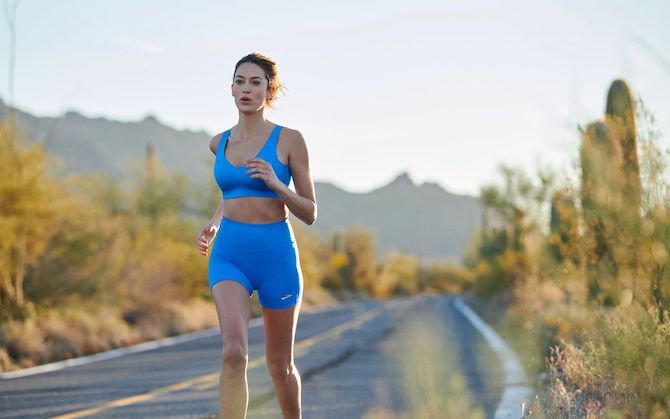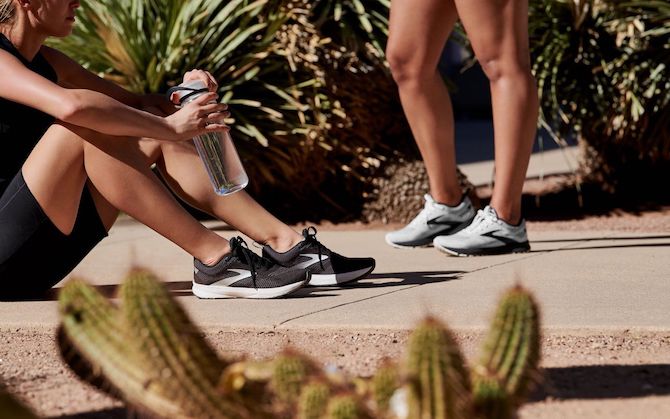How to stay cool when running in the heat

Running in the heat can lead to some challenging runs, but many experts agree that these summer runs are necessary to build speed and endurance and meet your goals. However, you don't have to suffer on every hot weather run. Tailoring your run and gear for the rising mercury can help you run smarter and happier, not harder.
Wear the best clothes for running in the heat
Wear as little as you're comfortable with on your runs, and for the layers you have to wear, make sure the material offers plenty of ventilation and moisture-wicking.
Opt for a mesh hat to keep the sun out of your eyes, keep you cool, and protect your scalp and face from sunburn. Bonus if your cap offers UV protection.
Choose lightweight and moisture-wicking summer running clothes
Have a look at our summer running clothes and choose a pair of lightweight shorts that are loose enough to not make running in the heat feel worse.
You may also consider ditching the cotton shirt and just running in a running bra or moisture-wicking tank top. Opt for maximum breathability and comfort first, then go for a design that fits your style vibes (we all want to look good when running, right?).
Prevent chaffing when running in the heat
With fewer layers also comes the risk of chafing, so it's a good idea to get some apparel with pockets large enough to fit your cell phone or keys so they're not moving around too much.
Women may opt for shorts longer than 12 centimeters to prevent chafing, as well. Some prefer tight-to-the-skin shorts, while others prefer a looser fit. What works will depend on your body shape.
Alternatively, many runners swear by Aquaphor and anti-chafing balms and creams
Apply SPF frequently when running in summer
Regardless of where you're running, make sure to wear a sweat resistant, high SPF sunscreen, a running hat, and some sunglasses to protect yourself from harmful UV rays, even on cloudy days.
Warm weather running has its perks, but there's no need to sweat more than necessary trying to reach your goals - or get a sunburn trying to catch the runner in front of you.
if you're running for longer than an hour in the summer heat and sweating heavily, make sure you take regular breaks to reapply sunscreen to prevent burning. And make sure to read our guide on skin protection for outdoor runners!
Stay hydrated in warmer weather to prevent feeling unwell
we all know that hydration is important for runners, but its even more critical before, during and after those hot summer runs.
Multiply your body weight by 2/3 to find your baseline daily requirement of water (in liters), then add approximately 350ml for every half-hour of activity. Chug a bottle an hour or so before you head out, then take a handheld bottle or hydration pack with you and take a long drinks every three kilometers.
For longer runs, you may want to consider adding electrolyte tabs to your drink or filling your bottle halfway with ice, then the other half with a sports drink.
We lose these precious electrolytes when we sweat, and if you're electrolyte deficient, symptoms can include cramping, feeling dizzy, or worse, fainting. After your runs, make sure to rehydrate and refuel with a healthy meal and plenty of water, too.
Adjust your running pace seasonally and slow down in summer
It's OK to slow down during summer runs. Needing to slow down during hot weather doesn't mean you're losing fitness. On those days, you may notice your heart rate is still elevated without as much effort. Instead of striving for a certain effort, just run without any time expectations and let your perceived effort guide you. That way, you're still getting a good workout even if it means you're not at your race pace.
Avoid the sun as much as possible
Take advantage of long summer days and run early in the morning before the heat really rises, or choose dusk for an early evening run after the sun falls in the sky. If you prefer to run during the middle of the day, pick a tree-lined road, drive to some wooded trails, or simply seek out the shade on your normal route.
Arm yourself with light, breathable fabrics, plenty of hydration, more than enough sun protection, and a good playlist, and the high temps won't stand in the way of a good run.
Our writer's advice is intended for informational or general educational purposes only. We always encourage you to speak with your physician or healthcare provider before making any adjustments to your running, nutrition, or fitness routines.


